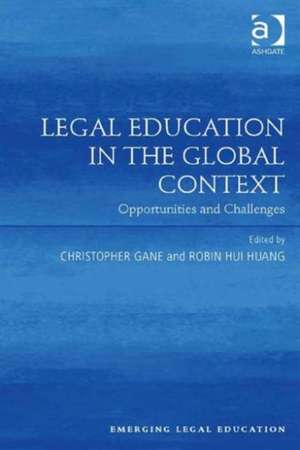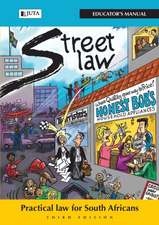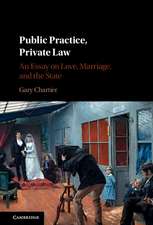Legal Education in the Global Context: Opportunities and Challenges: Emerging Legal Education
Editat de Christopher Gane, Robin Hui Huangen Limba Engleză Hardback – 9 dec 2015
Din seria Emerging Legal Education
- 8%
 Preț: 390.87 lei
Preț: 390.87 lei -
 Preț: 311.33 lei
Preț: 311.33 lei -
 Preț: 311.47 lei
Preț: 311.47 lei -
 Preț: 489.26 lei
Preț: 489.26 lei -
 Preț: 469.34 lei
Preț: 469.34 lei -
 Preț: 469.34 lei
Preț: 469.34 lei -
 Preț: 469.34 lei
Preț: 469.34 lei -
 Preț: 489.26 lei
Preț: 489.26 lei -
 Preț: 384.86 lei
Preț: 384.86 lei -
 Preț: 389.29 lei
Preț: 389.29 lei - 17%
 Preț: 259.98 lei
Preț: 259.98 lei -
 Preț: 370.10 lei
Preț: 370.10 lei -
 Preț: 349.71 lei
Preț: 349.71 lei -
 Preț: 389.66 lei
Preț: 389.66 lei -
 Preț: 383.89 lei
Preț: 383.89 lei -
 Preț: 389.66 lei
Preț: 389.66 lei - 18%
 Preț: 1120.11 lei
Preț: 1120.11 lei - 18%
 Preț: 1500.18 lei
Preț: 1500.18 lei
Preț: 825.21 lei
Preț vechi: 1143.57 lei
-28% Nou
Puncte Express: 1238
Preț estimativ în valută:
157.90€ • 164.86$ • 130.69£
157.90€ • 164.86$ • 130.69£
Carte tipărită la comandă
Livrare economică 04-18 aprilie
Preluare comenzi: 021 569.72.76
Specificații
ISBN-13: 9781472444967
ISBN-10: 1472444965
Pagini: 342
Dimensiuni: 156 x 234 mm
Greutate: 0.75 kg
Ediția:1
Editura: Taylor & Francis
Colecția Routledge
Seria Emerging Legal Education
Locul publicării:Oxford, United Kingdom
ISBN-10: 1472444965
Pagini: 342
Dimensiuni: 156 x 234 mm
Greutate: 0.75 kg
Ediția:1
Editura: Taylor & Francis
Colecția Routledge
Seria Emerging Legal Education
Locul publicării:Oxford, United Kingdom
Cuprins
Introduction, Christopher Gane and Robin Hui Huang. Part I Theoretical Framework: Getting back to our roots: global law schools in local context, Kate Galloway; Global challenges to legal education, John Flood; The bifurcation of legal education - national vs transnational, Hans-Wolfgang Micklitz; Learning opportunities in multi-national law school classes: potential and pitfalls, Carolyn Evans; Doctrine, perspectives, and skills for global practice, Simon Chesterman; Cultivating high-quality internationalized legal talents under legal globalization, Liu Xiaohong. Part II Shifts in Teaching Philosophies and Methods: The values dimension of legal education: educating for justice and service, Paul Redmond; Critique, philosophy, and the legally-trained citizen’s role in working towards just institutions, Seow Hon Tan; Rethinking teaching, learning and assessment in the twenty-first century law curriculum, Rick Glofcheski; The unfulfilled promise of law schools to prepare students for the practice of law: an empirical study demonstrating the effectiveness of general law school curriculum in preparing lawyers for the practice of law, John Sonsteng with Leigha Lattner, Emily Parks and David Camarotto; Integrating the idea of global governance and international collaboration into law school education, Shi Yan’an; Navigating e-spaces in legal education and legal practice, Rita Shackel. Part III International Experiences: The case of the common law in European legal education, Avrom Sherr; The challenge of massive open online courses (MOOCs) to traditional legal education: the Australian experience, Joellen Riley; The structure, purposes and methods of German legal education, Rainer Wernsmann; Reforming Taiwan’s legal education in the age of globalization, Ming-Yan Shieh and Yen-Chia Chen; Globalization and legal education in China today, Wang Zhenmin; The ideal and path of legal education reform in China, Ji Weidong; Legal education in the global context: the case of Hong Kong, Johannes M.M. Chan. Index.
Notă biografică
Christopher Gane is Dean at the Faculty of Law, Chinese University of Hong Kong. His research and teaching interests include domestic Criminal Law and Procedure, International Criminal Law and Human Rights. He is author of twelve books and more than fifty scholarly articles and papers. Robin Hui Huang is a Professor of Law at the Chinese University of Hong Kong. He specializes in corporate law, securities regulation, financial law, financial dispute resolution, and foreign investment, with a particular focus on Chinese and comparative law issues. He has held visiting posts at prestigious institutions including Harvard Law School and Cambridge Law School, and has been engaged as an expert by international organizations such as the World Bank.
Recenzii
"Globalization has transformed legal education from a nationally-oriented system to one that is multinationally-tuned. Legal practice and skill learning may have adapted to the resulting challenges and transformations, but the fundamental legal philosophy and spirit of justice seeking in legal training will remain forever. This book supports this view and helps to clarify the underlying principles shared in all law schools." - Shang-Jyh Liu, National Chiao Tung University, Taiwan
"At a time when many jurisdictions are re-visiting core questions about the law school and its curriculum, this is a most timely and valuable contribution to the debates. The focus of the book on globalization and internationalization shifts the attention away from domestic considerations to raise fundamental questions about the role of the law school in an era of globalized legal services." - Robert Lee, University of Birmingham, UK
"At a time when many jurisdictions are re-visiting core questions about the law school and its curriculum, this is a most timely and valuable contribution to the debates. The focus of the book on globalization and internationalization shifts the attention away from domestic considerations to raise fundamental questions about the role of the law school in an era of globalized legal services." - Robert Lee, University of Birmingham, UK
Descriere
This book discusses the opportunities and challenges facing legal education in the era of globalization and considers how students and law schools need to adapt for the future. It identifies the knowledge and skills that law students require and explores the pedagogical shifts that need to be made inside and outside the classroom. With contributions from leading experts on legal education from various jurisdictions across the globe, the work combines theoretical depth with practical insights and bridges the gap between theory and practice.









